- Sanitation systems
- Treatment of wastewater, sludges, organic waste, excreta
- Composting
- Composting with hot box method (Howard-Higgins system)
Composting with hot box method (Howard-Higgins system)
65.2k views
- MGuenard
-
 Less
Less- Posts: 5
- Karma: 1
- Likes received: 1
Just entering your discusssion.
I have read this scientific study on Thermophilic composting - a hygienization method of source-separated faecal toilet waste
orgprints.org/5838
This may help!
Please Log in to join the conversation.
You need to login to reply- joeturner
-
 Less
Less- Posts: 717
- Karma: 23
- Likes received: 185
richard higgins wrote:
P.S. If they want peer reviewed articles approving my system they are going to have to wait. I am trying to get an institution to carry this out.
I did ask Arno once, if all answers on this forum have to be scientifically proven.
there was no answer to this question.
If you are making extreme claims, you need some pretty good evidence. Some of us actually care about the truth.
Please Log in to join the conversation.
You need to login to reply- joeturner
-
 Less
Less- Posts: 717
- Karma: 23
- Likes received: 185
richard higgins wrote:
As far as we know so far, the World health Organisation take their guidance (or some of it) from the European Directive on destruction of harmful pathogens contained in the Animal by Products Regulations 142/2011, in regard to destruction of human pathogens contained in human effluent. This was conveyed to me by the research establishment in Swindon WRC in the UK that holds and compiles such relevant information.
www.wrcplc.co.uk/
If the level of pathogen destruction is acceptable by the UK and the USA why would it not be acceptable in Uganda? Are there any other standards for pathogen control in Uganda?
Utter rubbish. The WHO calculated their standard from a Monte Carlo Quantative Microbial Risk Assessment proceedure.
It is obvious that an acceptable pathogen reduction standard in the UK/Europe is irrelevant in other places where the pathogen load is much higher.
The WHO guideline standard for exreta use in agriculture is <1 helminth ova per g, <1000 E.coli per g - WHO 2006 Table 4.2 page 63 .
>and where a 3log10 reduction may not reduce >pathogens to safe levels as defined by >the WHO standard.
Please send me the document this definition comes from. I would love to see it.
See above. And please explain why you are not aware of this.
Also why would the pathogen loading be much higher outside the EU?
Human waste is human waste and for instance in the book by Joe Jenkins (Humanure) The world acclaimed accepted system for human waste disposal (by many) he makes no such distinctions.
Really? You are seriously asking why pathogen loadings are higher in places where there is more infection?
The levels of maintained temperatures of the destruction of Ascaris eggs is met easily by the Howard-Higgins System. That is why I say Ascaris eggs - no problem - More is the problem, I understand, that in South Africa, perticularly Durban, they have stored human effluent for 40 years and Ascaris eggs are apparently found breeding again at different times. Well my answer to that is treat it properly, through controlled temperature treatment and don't store it! Use it!
The temperature requirements acceptable for the WHO I believe is, in the destruction of pathogens, 50 degrees C for one week.
Here is a table on destruction of ascaris eggs:
Roundworm (Ascaris) eggs applied directly to soil Several years
unheated anaerobic digestion Many months
composting toilets Survive well
thermophilic composting Killed in 2 hrs at 55 degrees C or 20 hrs at 50 degrees C or 200 hrs at 45 degrees C
This is taken from European Commission:
ec.europa.eu/environment/waste/sludge/pdf/sludge_eval.pdf
see table 2.1 below
European Commission DG Environment
WRc Ref: CO 5026/1 / 12787-0
September 2001
Table 2.1 Pathogenic micro-organisms that may be found in sludge derived from
faecal material
Bacteria Protozoa
Salmonella spp. Entamoeba histolytica
Shigella spp. Giardia lambia
Escherichia coli (enteropathogenic strains) Toxoplasma gondii
Pseudomonas aeruginosa Sarcocystis
Yersinia enterolitica
Clostridium perfringens
Clostridium botulinum Helminths
Bacillus anthracis Taenia saginata
Listeria monocytogenes Taenia solium
Vibrio cholera Diphyllobothrium latum
Mycobacterium spp. Echinococcus gramulosus
Leptospira spp. Ascaris lumbricoides
Campylobacter spp. Ancylostoma duodenale
Staphylococcus Toxocara canis
Streptococcus Toxocara cati
Trichuris trichura
Viruses
Poliovirus Yeast
Coxsackievirus Candida albicans
Echovirus Candida krusi
‘New’ enterovirus Candida tropicalis
Adenovirus Candida guillermondii
Reovirus Cryptococcus neoformans
Hepatitis A-virus Trichosporon
Rotavirus
Astrovirus Fungi
Calicivirus Aspergillus spp.
Coronavirus Aspergillus fumigatus
Norwalk-like calicivirus Phialophora richardsii
Small round viruses Geotrichum candidum
Parvovirus Trichophton spp.
Adenoassociated viruses
Influenza virus
Epidermophyton spp.
2.2
3.1 Heat
3.1.1 Thermophilic temperatures
Pathogens are inactivated during exposure to heat, which to be effective and relatively rapid
must be above their optimum growth temperature. The period of exposure is dependent on
the temperature and on the species of the organism. Feacham et al. (1983) determined the
thermal death curve of a number of enteric pathogens. These have been collated into a single
graph by Strauch (1991 and 1998), which indicates a ‘safety zone’ where, if the operating
parameters were above the minimum requirements, the resultant sludge would be virtually
pathogen-free (Figure 3.1).
These data suggest that the operating parameters should be in excess of 7 minutes at 70°C;
30 minutes at 65°C; 2 hours at 60°C; 15 hours at 55°C or 3 days at 50°C.
A recent review for UK government departments of reported practical studies, much of which
were carried out as part of the COST 681 programme in the 1980’s, concluded that 70°C for
30 minutes or 55°C for 4 hours would produce a sludge that is virtually pathogen-free
(Carrington et al., 1998).
The differences in the suggested exposure times arise from differences in the design of the
two studies. The data of Strauch was based studies using pure cultures of the microorganisms, whereas the studies reported by Carrington allowed sufficient time to ensure the
efficient warming of the sludge and also took into account the movement of the sludge through
a continuous flow system. The UK workers thought that 30 minutes was the minimum
residence time that would ensure that all sludge had been exposed to lethal time-temperature
Hard to know where to start here, given I was working on some of these original trials. None of them involved believing that the whole windrow was sanitised in 30 mins/4 hours because we understood that the majority of the heap would never get to that temperature. Hence the need for turning. The truth is that you are misapplying a European standard, which is of no relevance anyway to a developing country.
Professor Reed, of WEDC Water Engineering and Development Centre happens to be a world authority on such things. WEDC advise NGO's of appropriate technology.
wedc.lboro.ac.uk/knowledge/booklets.html
Of course we would like our HH tecnology included in their books and papers, But it in lieu of funding at this present moment to publish a PhD peer reviewed paper in a medical journal, we have to continue as we are. But all temperatures shown in any papers I have found say that these harmful organisms are all destroyed at much lower temperatures than the HH -2 thermophilic system employs.
Yeah. And that for this discussion is irrelevant, given that Professor Reed is not able to tell the pathogen loading of your compost by eyesight. I am very happy to have a conversation with him, but having had conversations with many academics and workers in sludge composting over the years, I'm confident that nobody anywhere would make the outrageous claim that their compost was fully sanitised within 14 days.
Yes we believe we have, although at the turning out stage 14 days contents will be pathogen free. We analyze at 30 days due to the second heat increase in the system.
Cholera, the destruction for this organism is listed in the Humanure Handbook by Joe Jenkins.
I rest my case. You've not actually measured any pathogens at all have you?
Please Log in to join the conversation.
You need to login to replyIf there are other lists, for instance Uganda, please let me know where these can be found.
We did not specifically test for Ascaris eggs, but from this table you will see that these are destroyed at the temperatures described.
In our next test we will include other organisms that you can tell us about that are considered harmful pathogens to humans.
(note by editor (EvM): the embedded table was messed up, so I have converted it to a pdf file:)
Please log in or register to see it.
{Jenkins cites as his source: Feachem, et al. (1980) *Appropriate Technology for Water Supply and Sanitation*, The World Bank, Director of Information and Public Affairs, 1818 H St., Washington D.C. 20433. His chapter "Worms and Disease" also cites a number of other recent scientific studies on pathogen survival listing other bacteria, etc.}
How we have conducted these pathogen tests before is like this:
You take a cross section sample from 5 points in the sample and send it to the nearest lab for pathogen testing. They test for harmful pathogens for human health. These are the ones that are all included in the previous tables I have posted on the forum.
It is not that you ask the laboratory to test for this one or that one. This would probably be far more expensive.
That is why I have asked anyone if there is a different list that may apply to Uganda. If there is we will test at the micro biological laboratory there for the list of pathogens that applies to that country.
I hope this makes things clear.
regards
Richard
P.S. If they want peer reviewed articles approving my system they are going to have to wait. I am trying to get an institution to carry this out.
I did ask Arno once, if all answers on this forum have to be scientifically proven.
there was no answer to this question.
This message has an attachment file.
Please log in or register to see it.
Please Log in to join the conversation.
You need to login to replyI have found another entry you made with questions:
as you concluded your trials in Uganda, could you post the results? I would be especially interested in systematic data about the helminth eggs removal, do you have before - after combined with temperature?
Thanks in advance.
Christoph
There were no results posted from the Uganda trials unfortunately.
(note by editor (EvM): see also related discussion about these trials in Kampala where the hot-box composting method was investigated:
forum.susana.org/forum/categories/98-res...mit=12&start=12#3837)
Normal pathogen testing is done from a sample taken to a micro biological laboratory as I have done all my previous pathogen testing.
There was no such print out from the Uganda trials from the laboratory at Makerere University.
All I was emailed was that there were no pathogens found according to the the standards I have enclosed before.
This is completely acceptable in the United Kingdom. If it is not acceptable in your country? Please tell what the standards are there.
We are working with a top agricultural college here in the |UK to do further trials for PhD reviewed articles.
This we have not done yet, so if this is your interest, please bear with us.
best regards
Richard Higgins.
Please Log in to join the conversation.
You need to login to replyRe: Composting with hot box method (Howard-Higgins system)
>The Howard Higgins Method as proposed by Richard has not proven to be successful and the use may be dangerous. (If he proves me wrong, I do apologize in this space publically)
>Your really annoyed Christoph
I would have thought that my last posting on this forum would have proved that the system is successful.
Please go to Please go to sustainableagriculturelondon.ning.com/vi...itation-solutions-ii
and see the system in action at the Haiti earthquake disaster of 2010. This was done here without the use of Hot Boxes (HH -2)
I have had many students come through our centre to learn this process. If it is that important to anyone to understand this system, please come and do a course on it.
Or you can buy the book that includes the original science of Howard on this subject. It is permanently on display and available from our web site.
If it is not that important to you to find out how this system works then keep doing what you are doing. But all the students who have ever come on our course, and as I say
they are not from the SuSanA forum, go away understanding the process and very often start to utilize it themselves.
As regards the SEI the Swedish Environmental Institute and Dr. Rosemarrin. This is where the SuSanA conference is held in Sweden to discuss the updates and progress
of the last years progress in alternative sanitation. It is a very good conference to attend to gain more understanding of the detail of different systems and approaches to
operation and maintenance, capacity development etc.,
Because it is obviously very different to other systems and is new on the block, so to speak, it doesn't mean it doesn't work. We have had fantastic results for 15 years and have
never had any complaints from anyone; what to speak of from Environmental Health officers or Environment Agency officers.
The proprietor of our site is a professional footballer who wants to only eat organic food for his health and fitness. We grow him, and his family, organic food and we happen to recycle all the cat waste from his wife's cattery on the same site and grow the food crops with it after it has been through the Howard-Higgins HH -2 system, in conjunction with all the other wastes the estate produces.
This was the mission of Sir Albert Howard all those years ago. He researched the science back and found that Professor King, who wrote the title Farmers of Forty Centuries - Permanent Agriculture in China, Korea and japan - had discovered that the thermophilic science was employed by the Chinese for fertilizer production as far back as 4,700 years ago.
They employed all manner of wastes and were supporting the highest densities of population at the time of his research (1920's) namely up to 3,000 people per square mile.
On finding this out I trialled the system in England, saved up the money and went to trial it in India again, where I wrote the book. Our work is all depicted in
our title The Lost Science of Organic Cultivation, as per our web site, in colour plates and Howard's work is still in the original black and white plates.
Our second printing will be available soon.
Best Regards
Richard Higgins
co chair of WG5, Sanitation to Agriculture.
From: SuSanA forum <This email address is being protected from spambots. You need JavaScript enabled to view it.>
To: SuSanA forum <This email address is being protected from spambots. You need JavaScript enabled to view it.>
Sent: Saturday, 9 March 2013, 12:21
Subject: [SuSanA forum] Composting with hot box method (Howard-Higgins system) (Composting processes)
Attachments:
-
14dayoldcompost.JPG (Filesize: 68KB)
-
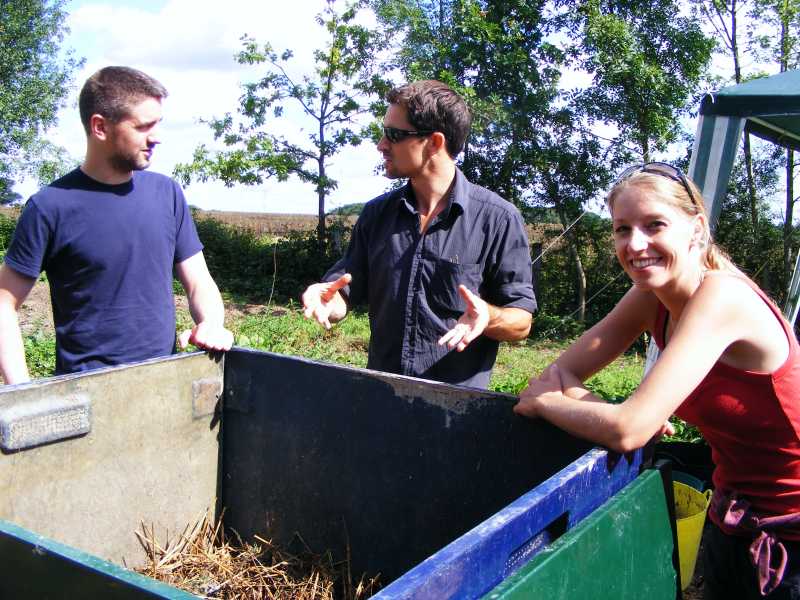 COURSESHEL...LEND.jpg
(Filesize: 77KB)
COURSESHEL...LEND.jpg
(Filesize: 77KB)
-
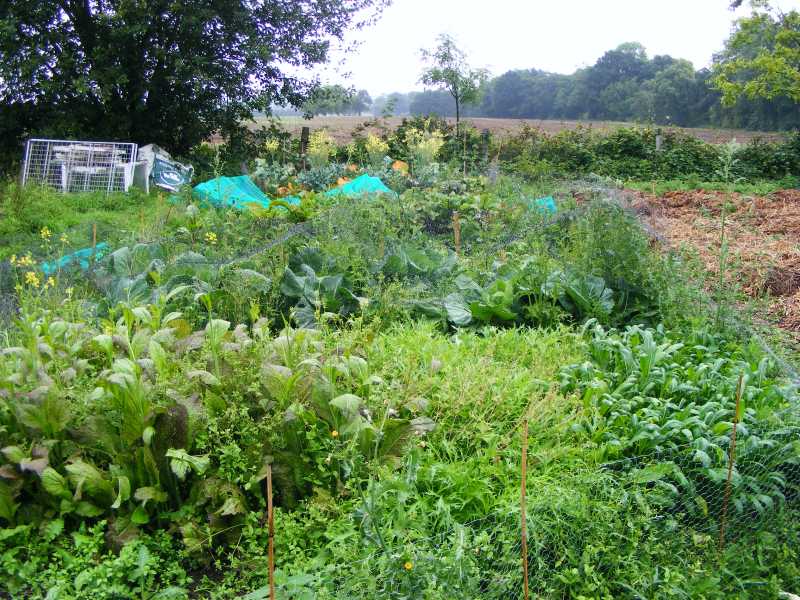 cropssownb...cast.jpg
(Filesize: 99KB)
cropssownb...cast.jpg
(Filesize: 99KB)
-
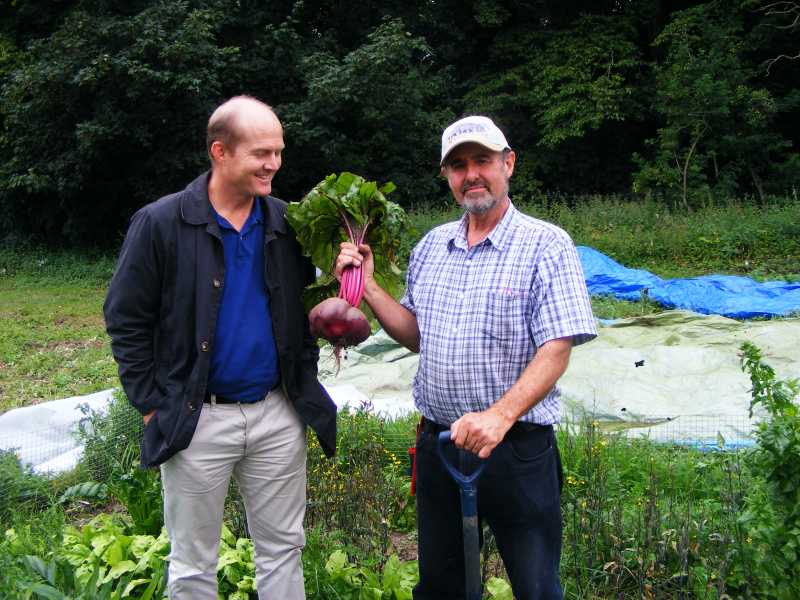 Directorof...gins.jpg
(Filesize: 69KB)
Directorof...gins.jpg
(Filesize: 69KB)
Please Log in to join the conversation.
You need to login to replyThan I was on the point do describe my SEI-CHR-GIZ method where we use rain water, sterilize it by the sunshine and than pour the sterilized water over the fecal material in order to get a pathogen free material. There have been publications about hygienization in Susana . And in general hygienization of rain water by solar heating is a prooven method , but I´m not able to describe more as we are thinking of a patent.
Than I thought to ignore everything ... as the people do which are mentioned by Richard (Arno???). But I´m not cool enough. Look. I am always in fear that somebody could trust or believe in all those words and mentioning of names and methods. Sanitation is a serious thing and therefore on a serious forum we have to put a stop on things which are not standing to that. Problem is.... and that has always been my problem with Susana. Who decides where to draw the line.
For me Richard has passed the line clearly and that has to be clarified.
The Howard Higgins Method as proposed by Richard has not proven to be successful and the use may be dangerous. (If he proves me wrong, I do apologize in this space publically)
Your really annoyed Christoph
Please Log in to join the conversation.
You need to login to reply>What pathogens have you measured. What results did you get (I want numbers and proof, >not just 'no pathogens were found' or 'all pathogens were destroyed'.
>You have said here that the compost meets UK standards and you previously said it met >the EU Animal Byproducts regulation standards. Kindly explain to me how that is useful >when you are talking about a system in Uganda (or anywhere else outside of the EU) >where the pathogen loading is much higher, and where a 3log10 reduction may not reduce >pathogens to safe levels as defined by the WHO standard.
As far as we know so far, the World health Organisation take their guidance (or some of it) from the European Directive on destruction of harmful pathogens contained in the Animal by Products Regulations 142/2011, in regard to destruction of human pathogens contained in human effluent. This was conveyed to me by the research establishment in Swindon WRC in the UK that holds and compiles such relevant information.
www.wrcplc.co.uk/
If the level of pathogen destruction is acceptable by the UK and the USA why would it not be acceptable in Uganda? Are there any other standards for pathogen control in Uganda?
>and where a 3log10 reduction may not reduce >pathogens to safe levels as defined by >the WHO standard.
Please send me the document this definition comes from. I would love to see it.
Also why would the pathogen loading be much higher outside the EU?
Human waste is human waste and for instance in the book by Joe Jenkins (Humanure) The world acclaimed accepted system for human waste disposal (by many) he makes no such distinctions.
>Have you measured Ascaris, if so, what method did you use and what results did you >get? Have you tested the compost to the WHO standard of <1 Ascaris ova per g?
The levels of maintained temperatures of the destruction of Ascaris eggs is met easily by the Howard-Higgins System. That is why I say Ascaris eggs - no problem - More is the problem, I understand, that in South Africa, perticularly Durban, they have stored human effluent for 40 years and Ascaris eggs are apparently found breeding again at different times. Well my answer to that is treat it properly, through controlled temperature treatment and don't store it! Use it!
The temperature requirements acceptable for the WHO I believe is, in the destruction of pathogens, 50 degrees C for one week.
Here is a table on destruction of ascaris eggs:
Roundworm (Ascaris) eggs applied directly to soil Several years
unheated anaerobic digestion Many months
composting toilets Survive well
thermophilic composting Killed in 2 hrs at 55 degrees C or 20 hrs at 50 degrees C or 200 hrs at 45 degrees C
This is taken from European Commission:
ec.europa.eu/environment/waste/sludge/pdf/sludge_eval.pdf
see table 2.1 below
European Commission DG Environment
WRc Ref: CO 5026/1 / 12787-0
September 2001
Table 2.1 Pathogenic micro-organisms that may be found in sludge derived from
faecal material
Bacteria Protozoa
Salmonella spp. Entamoeba histolytica
Shigella spp. Giardia lambia
Escherichia coli (enteropathogenic strains) Toxoplasma gondii
Pseudomonas aeruginosa Sarcocystis
Yersinia enterolitica
Clostridium perfringens
Clostridium botulinum Helminths
Bacillus anthracis Taenia saginata
Listeria monocytogenes Taenia solium
Vibrio cholera Diphyllobothrium latum
Mycobacterium spp. Echinococcus gramulosus
Leptospira spp. Ascaris lumbricoides
Campylobacter spp. Ancylostoma duodenale
Staphylococcus Toxocara canis
Streptococcus Toxocara cati
Trichuris trichura
Viruses
Poliovirus Yeast
Coxsackievirus Candida albicans
Echovirus Candida krusi
‘New’ enterovirus Candida tropicalis
Adenovirus Candida guillermondii
Reovirus Cryptococcus neoformans
Hepatitis A-virus Trichosporon
Rotavirus
Astrovirus Fungi
Calicivirus Aspergillus spp.
Coronavirus Aspergillus fumigatus
Norwalk-like calicivirus Phialophora richardsii
Small round viruses Geotrichum candidum
Parvovirus Trichophton spp.
Adenoassociated viruses
Influenza virus
Epidermophyton spp.
2.2
3.1 Heat
3.1.1 Thermophilic temperatures
Pathogens are inactivated during exposure to heat, which to be effective and relatively rapid
must be above their optimum growth temperature. The period of exposure is dependent on
the temperature and on the species of the organism. Feacham et al. (1983) determined the
thermal death curve of a number of enteric pathogens. These have been collated into a single
graph by Strauch (1991 and 1998), which indicates a ‘safety zone’ where, if the operating
parameters were above the minimum requirements, the resultant sludge would be virtually
pathogen-free (Figure 3.1).
These data suggest that the operating parameters should be in excess of 7 minutes at 70°C;
30 minutes at 65°C; 2 hours at 60°C; 15 hours at 55°C or 3 days at 50°C.
A recent review for UK government departments of reported practical studies, much of which
were carried out as part of the COST 681 programme in the 1980’s, concluded that 70°C for
30 minutes or 55°C for 4 hours would produce a sludge that is virtually pathogen-free
(Carrington et al., 1998).
The differences in the suggested exposure times arise from differences in the design of the
two studies. The data of Strauch was based studies using pure cultures of the microorganisms, whereas the studies reported by Carrington allowed sufficient time to ensure the
efficient warming of the sludge and also took into account the movement of the sludge through
a continuous flow system. The UK workers thought that 30 minutes was the minimum
residence time that would ensure that all sludge had been exposed to lethal time-temperature
>I am not interested in what professor from Loughborough said, I don't care about what >John Innes said, I don't care how many courses you are putting or or how many special >qualifications you have.
Professor Reed, of WEDC Water Engineering and Development Centre happens to be a world authority on such things. WEDC advise NGO's of appropriate technology.
wedc.lboro.ac.uk/knowledge/booklets.html
Of course we would like our HH tecnology included in their books and papers, But it in lieu of funding at this present moment to publish a PhD peer reviewed paper in a medical journal, we have to continue as we are. But all temperatures shown in any papers I have found say that these harmful organisms are all destroyed at much lower temperatures than the HH -2 thermophilic system employs.
>Kindly answer these questions. They are quite straightforward and fairly basic if you >want anyone to believe that you have really invented a system which sanitises at a >speed which is ten-times faster than anything measured before.
Yes we believe we have, although at the turning out stage 14 days contents will be pathogen free. We analyze at 30 days due to the second heat increase in the system.
Also kindly explain how you know that your system in Haiti was safe to destroy Cholera. Did you actually spike and measure the decay of cholera in your system?
Cholera, the destruction for this organism is listed in the Humanure Handbook by Joe Jenkins.
regards
Richard Higgins
New Directions Foundation
Please Log in to join the conversation.
You need to login to replyRe: Howard-Higgins composting system Windmill-driven ATADS
Elizabeth has consolidated all emails on this subject into one block. I have not seen your reply here before..
The Howard-Higgins system HH -2 is not to do with germinating seedlings. It is about making the fertilizer/compost which then goes on to grow all types of crops.
So I think that was a crossed wire.
Regards
Richard.
Attachments:
-
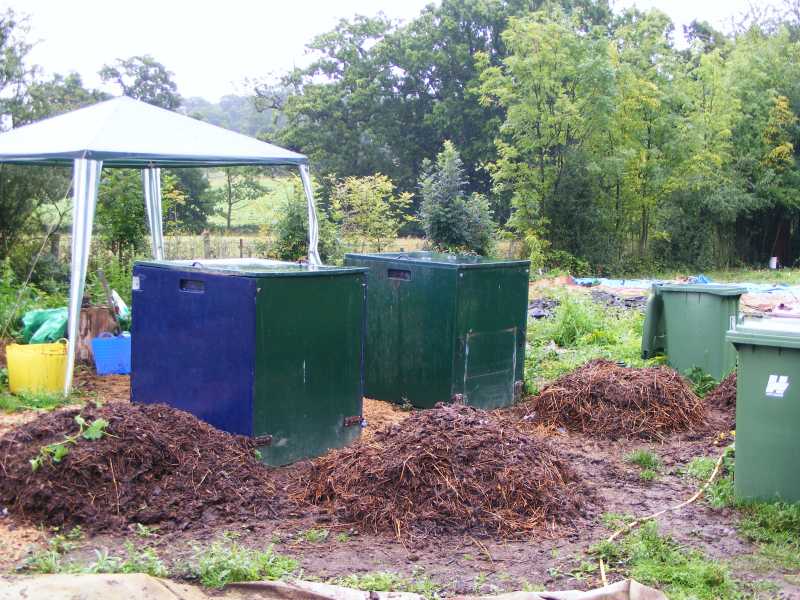 pairofHotBoxes.jpg
(Filesize: 80KB)
pairofHotBoxes.jpg
(Filesize: 80KB)
Please Log in to join the conversation.
You need to login to replyI am not clear how you can state here that your system is working, I had the impression that the system is not reliable because Karsten wrote before (post #3586)
(underlining by me)The test unit in Kampala showed that under the circumstances urea treatment gave pathogen free material and we did not get the same robustness of treatment from composting.
He clearly reffered that he would continue with the Urea treatment but not with the Howard Higgins System. As I am a fan of thermopilic composting as a secondary treatment (I understand that the Howard Higgins System is a risky version of thermopilic composting), I asked
It would be very necessary to get some more specific information (which I guess is in the attachment).
The question which come up:
• Composting not so robust. As this puts a question mark on heat composting, I guess it is very important to be more than clear about the testing conditions. a) to be able to think if it was the way of use, b) the time of composting c) the experiment conditions or a general problem of composting. What has been your impression /conclusion?
• How did you do the pathogen analysis? A material and methods would be very helpful to be able to understand better. You wrote "pathogen free".
I asked Karsten but in reality the question should go to you please look at (post #3595) and as well at #3262
I asked
My reading would be: Only one cycle in Feb 2012 has been under total scientific conditions, before and after were used to set up, take down etc. Is that right? What is one cycle? Just collection of the feces from 2.000 persons and processing? From how many days? And the real results, numbers graphs, could you put that on?
So I'm hoping for answers.
Thanks
Christoph
Please Log in to join the conversation.
You need to login to reply- joeturner
-
 Less
Less- Posts: 717
- Karma: 23
- Likes received: 185
richard higgins wrote: Dear SuSanA forum and Joe Turner,
Please ask those technical questions again. I try to answer all questions and none have gone unanswered as far as I know.
Richard, this is the fourth time I have asked these questions.
What pathogens have you measured. What results did you get (I want numbers and proof, not just 'no pathogens were found' or 'all pathogens were destroyed'.
You have said here that the compost meets UK standards and you previously said it met the EU Animal Byproducts regulation standards. Kindly explain to me how that is useful when you are talking about a system in Uganda (or anywhere else outside of the EU) where the pathogen loading is much higher, and where a 3log10 reduction may not reduce pathogens to safe levels as defined by the WHO standard.
Have you measured Ascaris, if so, what method did you use and what results did you get? Have you tested the compost to the WHO standard of <1 Ascaris ova per g?
I am not interested in what professor from Loughborough said, I don't care about what John Innes said, I don't care how many courses you are putting or or how many special qualifications you have.
Kindly answer these questions. They are quite straightforward and fairly basic if you want anyone to believe that you have really invented a system which sanitises at a speed which is ten-times faster than anything measured before.
Also kindly explain how you know that your system in Haiti was safe to destroy Cholera. Did you actually spike and measure the decay of cholera in your system?
I don't believe it is possible for any aerobic sewage composting system to fully sanitise in 14 days. There is no scientific literature that says this is possible, I don't know anyone or any system that claims to work on that basis other than yours.
So convince me.
+++++++++++++++++++++++
Note by moderator (EvM) to all: I have now compiled all previous posts on the Howard Higgins hot-box composting process into this one single thread so that we have all the posts and questions together in one thread. Scrol up to see previous conversations we have had on this process.
Please Log in to join the conversation.
You need to login to replyI have asked you for
proper proof and asked technical questions about this system several
times.? Everything else you say is nonsense whilst you refuse to respond to those important questions.
Please ask those technical questions again. I try to answer all questions and none have gone unanswered as far as I know.
There needs to be a revival in the manufacture of compost made with human waste.
This
is what we do. Our training centre is open to the public and we have
already course takers from various countries all of whom are not on the
SuSanA conference.
Our system passes all the Environment Agency regulations of the United Kingdom
Our system passes all Environmental Health regulations of the United Kingdom
I have posted analyses from various laboratories on this conference before on the testing of our end product
Every time we have tested there have been negative results for whatever we were testing for.
IE., pathogens and toxocara parasite.
The Howard-Higgins system HH -2 is unique and does not seem to be
carried out any where except by us. We do not make a 'sludge compost.'
We make an optimum nitrogenous compost/fertilizer of the highest value.
We now make a seed compost too. This can sell at prices higher than all
the other special fertilizer supplements that you can buy. IE., seaweed
meal,garden potash or poultry based pelleted manure,etc., It is made
completely from garbage and human waste.
I think the vast majority composting of
sludge is a misnomer and that the claims you make are unproven and
probably dangerous.? Prove me wrong.
We took a bag to the John Innes comppost manufacturers in Suffolk UK, who carried out an analysis for us.
They said you are creating top soil - how do you do it???? www.johninnes.info/about.htm
Our training centre is open to the public and we have
already course takers from various countries all of whom are not on the
SuSanA conference. We have orders for the system in Senegal, Kenya, Uganda and Nigeria.
Please come and do a course here.
Until we have more funding we cannot set up training centres anywhere else. Although the Director of the Swedish
Environmental Institute, Dr. Rosemarrin, said 'this should be taught from football stadiums' when I presented the system
at the SuSanA meeting there recently.
Testing for capacity development was carried out recently at the farm of Makerere University near Kampala, January 2012.
This was visited by the group Slum Dwellers International, who said they want to work with this system.
This is where we put the weekly toilet waste of 36 houses, in bioliners, along with 300 MHM pads and 200 Peepoo bags
(Oxfam) through our 1.5 cubic metre vessel. All inputs had disappeared in 14 days. Subsequent testing for pathogens
showed negative. Please see pictures enclosed on this email. I cannot up load
pictures on the SuSanA forum reply page.
This system of the generation of controlled fungi and bacteria was carried out by Howard 100 years ago. I have simply
developed the system further.
This work is documented in the title The Lost Science of Organic Cultivation and is available on our web site along with
our current courses:
www.sustainableagriculturelondon.co.uk
Best regards
Richard Higgins
Total Nutrition through Food
Partnered ?with NorgesVel?International DevelopmentClusa and the Swedish Co-operative Centre, Mozambique
Co chair WG05: The?Sustainable Sanitation Alliance, Germany
Trustee: The Good Gardeners Association (nutrition)
Speaker on behalf of the Soil AssociationFounder: Well End Permaculture International and the
Howard-Higgins-Holistic-Health-Healing-Habitats
Founder: Bio Fertile Farming Consultancy
Agricultural researcher and advisor to:
SuSan Design, NorgesVel, and
New Directions Foundation
+++++++++++++++
Attachments:
-
6Biolinersperday.JPG (Filesize: 77KB)
-
36bioliner...pear.JPG (Filesize: 89KB)
-
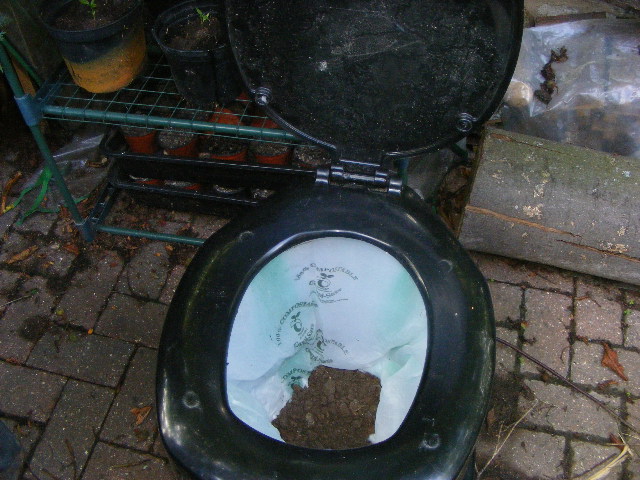 blackEnvirosan003.jpg
(Filesize: 117KB)
blackEnvirosan003.jpg
(Filesize: 117KB)
Please Log in to join the conversation.
You need to login to reply- Sanitation systems
- Treatment of wastewater, sludges, organic waste, excreta
- Composting
- Composting with hot box method (Howard-Higgins system)







